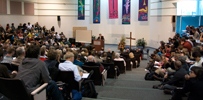Does this really matter right now? Reflecting on work in a time of COVID

Regent College's Hilary Guth reflects on the meaning and relevance of "non-essential" work at a theological college during a global pandemic, sharing her process of realizing that, indeed, the work of Regent College matters significantly right now.
The other day, I called my parents.
“I feel morose,” I told them.
“Why, honey?”
“Because…everything.”
What else is there to say, really? It feels like the answer to so many questions right now. What’s wrong? Everything. What are you worried about? Everything. What hurts? Everything.
I get distracted when I’m working. I’ll be writing an email, and suddenly I’ll find myself looking at the Johns Hopkins coronavirus tracker, again, watching the red number (cases) and the white number (deaths) tick up, and up, and up. I read stories about doctors and nurses doing heroic things and facing tragic decisions, and I feel spectacularly useless as I sit at my dining room table answering emails and moving columns around on a spreadsheet. What’s the point of this?
Earlier this week I realized that I’ve stopped wondering when things will go back to normal, and started wondering whether there will be a normal to go back to.
What’s different now? Everything.
And yet.
And yet, I have to keep going. I have a job to do. And that job is…
Figuring out how to ask people like you for money.
Yeah. It’s awkward.
How do you fundraise in a pandemic? The number of articles and webinars offering to answer this very question is daunting—enough so that after just a couple days of working from home I dragged all the professional development emails out of my inbox and into a side folder that I will definitely…probably…maybe…sort of…look at someday. All the expert advice makes sense, but it rings hollow. “Explain your need. Tell people how your organization is affected by the COVID crisis. Show how you’re making a difference in these troubled times.”
All well and good if you’re fundraising for a food bank or a relief organization, I think snarkily. I’m not naïve enough to think that raising money for an organization that meets basic human needs (food, shelter, medicine) is easy right now, but I feel instinctively that it should be easy. For those organizations, the big questions have easy answers. Why give? Because of the alternatives. Poverty. Suffering. Death.
But I’m fundraising for a graduate school of theology. A wonderful, fantastic, amazing graduate school of theology (yes, I’d say that even if I didn’t work here)…but still. I ask myself why donors should give to Regent College right now, and I don’t come up with easy answers.
I look at the news, at the statistics (cases and deaths, ticking ever upward), and at the near-empty streets outside my window, and what doesn’t come to mind is, “Wow, grad school is such an essential service!”
And yet.
And yet, even if part of me feels like everything has changed, deep down I know it hasn’t.
Even if it feels like nothing matters, some things do.
Because God is still here. God hasn’t changed. God won’t change. And God matters.
Knowing God matters, even when everything is falling apart. Especially when everything is falling apart. And maybe even more so when the time comes to start putting things back together.
Regent is about helping people know God. That matters. It matters for the people who study at Regent, and it matters for the people they’ll encounter, the people they’ll follow, lead, work with, play with, listen to, and minister to for the rest of their lives.
I ask myself what I’ve learned about God at Regent. I think about Old Testament Foundations, where the first lesson was that we have to understand everything we know about God in the context of God’s love. I think about Christian Thought and Culture, where I learned how the early Christians devoted themselves to serving victims of the Roman plagues, bringing new life out of death. I think about the Global Christology seminar in which Japanese theologians introduced me to Jesus as one who suffers not only for us but also with us.
Regent also taught me that knowing God can’t be separated from knowing what it means to be human. This, too, matters.
Knowing what it means to be human matters even when people are dying and we wonder if society itself is crumbling. Especially then. And maybe even more so when we ask ourselves what we want to do and who we want to be in a world that isn’t going to look the same on the other side of this crisis.
Regent taught me that being human matters. That being human is good. And there is so much grace in that, because humans aren’t perfect. Sometimes they’re not happy. Sometimes they’re not okay.
Regent is the first Christian community I’ve been a part of that didn’t tell me in a hundred subtle ways that I should be perfect, happier, more okay. On my first day of orientation, I learned that Regent’s first official event was a funeral, and I thought to myself, “This is why God brought me here. They understand.”
It’s a strange thing to say, but to me one of the best things about Regent is that somehow, deep down in its bones, Regent understands suffering. It’s honest about suffering. And blessedly—blessedly—it doesn’t try to explain it or explain it away.
Regent taught me lament. That’s never felt more relevant. A lot of people are not okay right now, and a lot of people are not going to be okay for a long time. A lot of Christians aren’t going to know what to do with that. But I think Regent people will, at least a little. And that matters.
So.
I think I’ve re-convinced myself that, yes, Regent does matter in a time of COVID-19. It matters now, and it will matter as all the…everything…continues, and it will matter afterward (whenever “afterward” comes, and whatever it looks like).
Regent matters because knowing God matters, and knowing what it means to be human matters. It matters even when “why does this matter?” can be hard to answer.
Maybe it matters, in part, because “why does this matter?” can be hard to answer. There are many, many questions to ask at this moment in history. Some of them have obvious answers. In a time of crisis or otherwise, humans have certain basic needs. Food. Shelter. Medicine. But there are other needs and other questions that don’t have easy answers. And I believe—really, truly believe—that Regent is preparing students to live and serve and glorify God in a world without easy answers. That matters.
And yet.
And yet, it still feels awkward to ask you for money—even though I’m asking for Regent, even though I truly believe it will do good. So maybe, for right now, instead of asking, I’ll just tell you some things.
I’ll tell you that I know the economy is bad, and employment is precarious, and there are a lot of excellent reasons to be very, very careful about spending right now.
I’ll tell you that I know, and that I understand—I really, really do—that giving isn’t possible for some of you right now. I’ll tell you that’s okay.
I’ll also tell you that Regent really does need money. And I’ll tell you that my colleagues and I are going to keep reminding you of that. I’ll tell you that we’re trying really hard to balance being honest about the College’s needs and being sensitive to your circumstances. But I’ll tell you right now that we won’t always get it right.
And I’ll also tell you this. Whether or not you give to Regent right now—whether or not you ever give to Regent—I’m grateful for you. I’m praying for you. We are one in Christ. And I wish you well.
Hilary Guth
Grants, Research, and Appeals Officer




